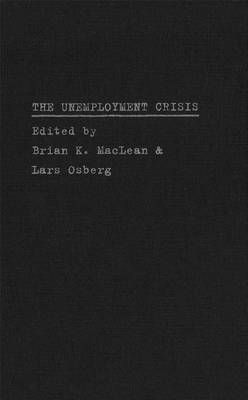Critical Perspectives on Public Affairs
1 primary work
Book 6
Arguing that the consequences of the unemployment crisis could have been avoided by better government policies, particularly less restrictive monetary control, the contributors examine the effect of the zero-inflation policy adopted by the Bank of Canada and the role of unemployment insurance on the unemployment crisis of recent years. Their analysis includes discussion of various facets of unemployment in France, Germany, and Japan for comparison. Contents Introduction - Brian K. MacLean and Lars Osberg Digging a Hole or Laying the Foundation? The Objectives of Macroeconomic Policy in Canada - Lars Osberg The Unbearable Lightness of Zero-Inflation Optimism - Pierre Fortin (UQAM) Real Interest Rates and Unemployment - John Smithin (York) Using the NAIRU as a Basis for Macroeconomic Policy: An Evaluation - Mark Setterfield (Trinity College) Does Unemployment Insurance Increase Unemployment? - Shelley Phipps (Dalhousie) Why Do We Know So Little About Unemployment Determination and UI Effects?
- Tony Myatt (UNB) Unemployment Insurance and Unemployment - Revisited - Lars Osberg The Rise of Unemployment in Ontario - Andrew Sharpe (Centre for the Study of Living Standards) Unemployment among Canada's Aboriginal Peoples - Helmar Drost (York) Unemployment Persistence in France and Germany - Dominique Gross (Simon Fraser) Low Unemployment in Japan: The Product of Socio-economic Coherence - Patrice de Broucker (Statistics Canada) A Macroeconomic Policy Package for the 1990s - Mike McCracken (Informetrica). Both critical of past performance and optimistic about future possibilities, The Unemployment Crisis makes a timely and valuable addition to current literature on economic policy.
- Tony Myatt (UNB) Unemployment Insurance and Unemployment - Revisited - Lars Osberg The Rise of Unemployment in Ontario - Andrew Sharpe (Centre for the Study of Living Standards) Unemployment among Canada's Aboriginal Peoples - Helmar Drost (York) Unemployment Persistence in France and Germany - Dominique Gross (Simon Fraser) Low Unemployment in Japan: The Product of Socio-economic Coherence - Patrice de Broucker (Statistics Canada) A Macroeconomic Policy Package for the 1990s - Mike McCracken (Informetrica). Both critical of past performance and optimistic about future possibilities, The Unemployment Crisis makes a timely and valuable addition to current literature on economic policy.
